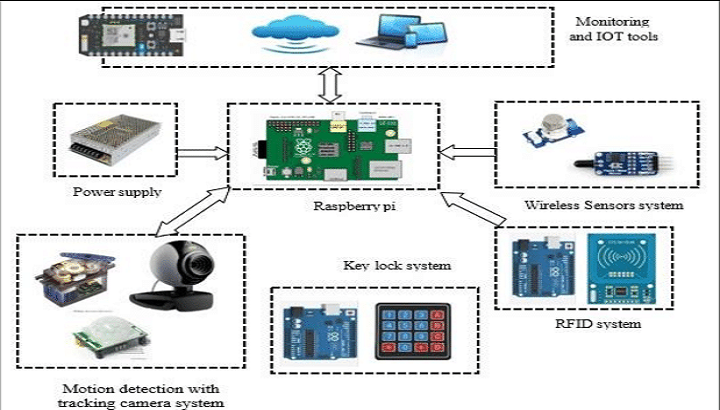Security and Surveillance System

Complementing the video surveillance component, the Security and Surveillance System incorporates motion sensors strategically deployed throughout the facility to detect any unauthorized entry or suspicious activity promptly. These sensors serve as the frontline defense, triggering immediate alerts to security personnel, thereby enabling swift and decisive responses to security incidents. Furthermore, the system integrates state-of-the-art access control mechanisms, such as electronic keycards or biometric scanners, to regulate access to restricted areas within the facility. By leveraging IoT-enabled access control systems, the Security and Surveillance System ensures that only authorized personnel can access sensitive infrastructure components, mitigating the risk of insider threats and unauthorized access.
One of the defining features of the Security and Surveillance System is its remote monitoring and management capabilities, facilitated by a centralized monitoring platform. This platform empowers security personnel to access live camera feeds, receive real-time alerts, and manage security incidents from any location with internet connectivity. Such flexibility not only enhances operational efficiency but also enables rapid response to security threats, irrespective of geographical constraints. Moreover, the system incorporates tamper detection mechanisms, utilizing IoT sensors to detect and alert security personnel of any attempts to tamper with surveillance equipment or critical infrastructure components. This proactive approach to security minimizes the risk of sabotage and ensures the integrity of the surveillance system.
Finally, the Security and Surveillance System is designed to seamlessly integrate with local law enforcement or emergency response agencies, facilitating coordinated responses to security incidents or emergencies. By establishing robust communication channels between the security system and external stakeholders, the system enhances overall safety and security measures, safeguarding telecommunications facilities against a wide range of potential threats. In summary, the Security and Surveillance System represents a paradigm shift in the protection of critical infrastructure, leveraging IoT technologies to deliver proactive, real-time security solutions tailored specifically for the telecommunications industry.
Key Components and Features:
- Video Surveillance: Install high-definition video cameras equipped with IoT connectivity to provide real-time video monitoring of key areas within and around telecommunications facilities.
- Motion Detection: Integrate motion sensors with the surveillance system to detect and alert security personnel of any suspicious activity or unauthorized entry.
- Access Control: Implement IoT-enabled access control systems, such as electronic keycards or biometric scanners, to regulate access to restricted areas and track employee movements.
- Remote Monitoring and Alerting: Develop a centralized monitoring platform that enables security personnel to remotely access live camera feeds, receive real-time alerts for security breaches, and take appropriate action as needed.
- Tamper Detection: Utilize IoT sensors to detect tampering or sabotage attempts on surveillance equipment or other critical infrastructure components, triggering immediate alerts and responses.
- Integration with Emergency Services: Integrate the security and surveillance system with local law enforcement or emergency response agencies to facilitate rapid response to security incidents or emergencies.
Problem Statement: Telecommunications facilities, including data centers, equipment sites, and network infrastructure, are critical assets that require robust security measures to protect against unauthorized access, vandalism, and security threats. Traditional security systems often lack the real-time monitoring, remote accessibility, and automated alerting capabilities necessary to effectively safeguard these facilities. As a result, there is a pressing need for an advanced security and surveillance solution tailored specifically for the telecommunications industry.
Related project idea for free
Design and implementation of an IoT-Based diabetes remote monitoring system
Real-time diabetes remote monitoring uses Internet of Things (IoT) technology to measure blood glucose levels, heart rate, blood pressure, and body temperature. Typically, a self-management system for diabetes is designed to detect the presence of particular molecules, particularly hyperglycemia, to...
Read more>>IoT base smart water leakage detection system
In life, water is a valuable resource. Water is essential for life and is utilized for a variety of activities in daily life. This device was developed to detect a pipe leak and maintain it directly in a short period of time. In order to prevent problems, it is crucial to have real-time management o...
Read more>>Smart miner helmet and monitoring system - IOT Project
The usage of technology in Rwanda's mining industry has made it difficult to avoid deaths in mines; it is for this reason that miner safety from threats outside and inside mining tunnels is critical. The process of mining minerals underground is fraught with dangers such as high concentrations o...
Read more>>AI-Enabled IoT mobile application for early maize plant disease detection
For Rwanda's small-scale farmers, the maize crop has grown significantly in importance as a crop for food security and income. Unfortunately, a number of illnesses continue to cause maize producers to have much lower yields. Diseases have a negative impact on the quality of maize harvests and im...
Read more>>Water tank quality and level monitoring system
All humans need water to survive; some of the uses of water include drinking, cooking, cleaning, and hygienic needs. Sometimes water shortages due to climate change or prolonged sunny weather, water pipeline breakdowns, poorly functioning water treatment facilities, and increased water demand in var...
Read more>>